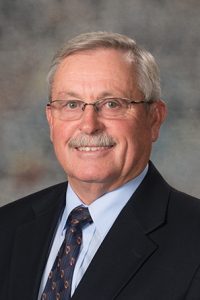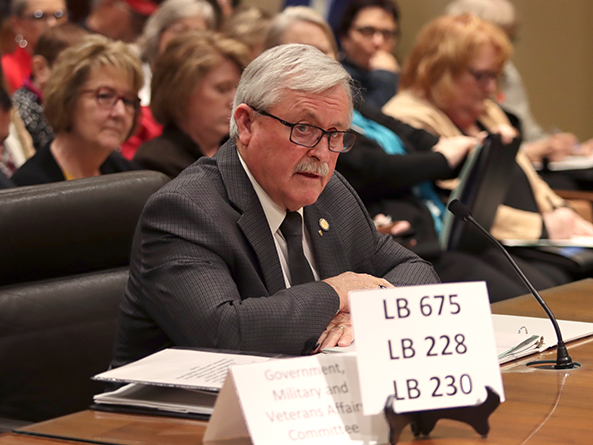Trio of election bills considered
The Government, Military and Veterans Affairs Committee took combined testimony on three bills March 1 that would make a number of changes to the state’s election laws in the wake of a successful 2022 petition drive to establish a photo ID requirement to vote in Nebraska.

LB228, introduced by Sen. Steve Erdman of Bayard, would eliminate voting by mail except for military personnel and those living in nursing homes and assisted living facilities. The bill also would:
• establish primary and general election days as statewide holidays;
• stipulate that all ballots be counted at the precinct level on election day; and
• limit early voting to in-person at either a county election or county clerk’s office.
Erdman said mail-in voting is expensive and doesn’t necessarily increase voter turnout. Requiring votes to be cast and counted at the precinct level on election day would ensure that ballots are secure and not in danger of being “messed with,” he said.
Erdman also introduced LB230, which would define qualifying photographic identification for voting purposes. The bill also would limit the option of early voting to those who are “handicapped” or members of the armed forces or Nebraska National Guard.
Among other provisions, the bill would make it a criminal offense for an election official to fail to require a voter to show photo ID and would require an agent delivering a ballot to include a color photocopy of the registered voter’s qualifying photo ID.
Erdman called LB230 a “comprehensive plan” to determine qualifying photo ID for voting in Nebraska elections. Under the bill, qualifying ID would be one of the following: driver’s license or state issued ID, Nebraska voter ID, U.S. passport or tribal ID issued by a recognized Indian tribe. A qualifying photo ID could not be more than 60 days past its expiration date.
An American flag symbol would be placed on the front of each driver’s license or state ID card issued to individuals who have verified status as a U.S. citizen.
“We have an opportunity to accomplish what the voters required us to do by their vote,” Erdman said. “It’s not our intent with this bill to [prevent] anyone from voting.”
Omaha Sen. Jen Day offered LB675, a broad elections bill that would, among other provisions:
• state legislative intent to provide funding to the Nebraska secretary of state’s office to ensure that all Nebraska polling places are ADA compliant;
• require the state Department of Motor Vehicles to expand hours and staffing beginning two months prior to the start of in-person voting;
• require the secretary of state to provide capacity at each election location to print qualifying ID on election day;
• provide additional locations where qualifying ID can be obtained for voting, including libraries and nonprofit organization offices; and
• require increased election office staffing and training.

LB675 also states legislative intent to appropriate $1 million for a public awareness campaign regarding new photo ID requirements and outlines more than a dozen types of qualifying ID, including student ID cards, Social Security and Medicaid cards — even if expired.
Day said the purpose of photo ID for voting is to verify an individual’s identity, which can be done whether an ID is expired or not. The bill was drafted over the interim with input from experts, she said, and would protect voting rights in ways that other bills considered by the committee this session would not.
“LB675 reflects the will of the voters while protecting the marginalized,” Day said. “Election integrity has two sides — protections and safeguards of the process, but also accessibility of the election itself. No election has integrity when an eligible voter is turned away.”
Over seven hours of testimony, supporters of LB228 and LB230 argued the proposals would strengthen voter confidence in elections and that mail-in voting is incompatible with the state’s new photo ID requirement. Many also criticized LB675 for allowing qualifying forms of ID that lack photos.
Cindy Miller of Washington County testified in opposition to LB675. The bill contains “expensive fluff” that would not do much to ensure election integrity, she said, which is Nebraskans’ primary concern. She spoke in favor of LB228 and LB230.
Other states are looking at ways to hand count ballots at the precinct level, she said, and Nebraska could do the same. In addition, she said, limiting voting to election day would help ensure confidence in the election process.
“Voter ID is just the first step in ensuring our elections are secure,” Miller said. “There’s a lot of problems with mail-in ballots.”
Dean Kleinschmit of Crofton also testified in support of Erdman’s proposals. Returning to voting on election day and hand counting at the precinct level would encourage civic engagement, he said. All other political issues are irrelevant if the people can’t trust elections, he added.
“We all need to do our civic duty,” Klienschmit said. “The number one issue everybody has is trying to have faith in our election system.”
George Boll testified in opposition to LB675, saying the successful initiative petition specified that voters must present a photo ID. However, many of the 18 qualifying forms of ID specified in the bill do not include a photo, he said, and the measure does not require early voters to present a qualifying ID.
“What a stab in the back this bill is to the great Nebraska second house,” Boll said.
Amy Bennett, executive director of WYCA Grand Island, testified in favor of LB675, specifically the provision requiring the DMV to expand hours and staffing prior to the start of in-person voting.
“Currently, rural communities have limited access to their DMV [offices],” she said. “The DMVs in Hamilton, Howard and Merrick counties are only open one day a week.”
Several election officials testified in opposition to both LB228 and LB230, mostly on logistical grounds.
Douglas County election commissioner Brian Kruse testified in opposition to both bills. Currently, 11 Nebraska counties conduct elections entirely by mail, he said, and other counties have mail-only precincts or conduct mail-only special elections. In addition, he said, hand counting would require adding precincts and staff, all at additional cost.
For example, Kruse said, many precincts in Cherry County do not have a location for people to vote in person that is ADA compliant, and some have no physical location other than a private home.
“This would be a drastic change for them — if even possible,” Kruse said. “Voters voted last November on voter ID; they did not vote on eliminating [vote] by mail.”
Seward County clerk Sherry Schweitzer also testified against LB228 and LB230, saying both bills “go way beyond” what voters approved regarding photo ID requirements. May individuals would not qualify as “physically incapacitated” under LB230, she said, but could have great difficulty voting in person due to illness or family or work circumstances
The committee took no immediate action on any of the proposals.


